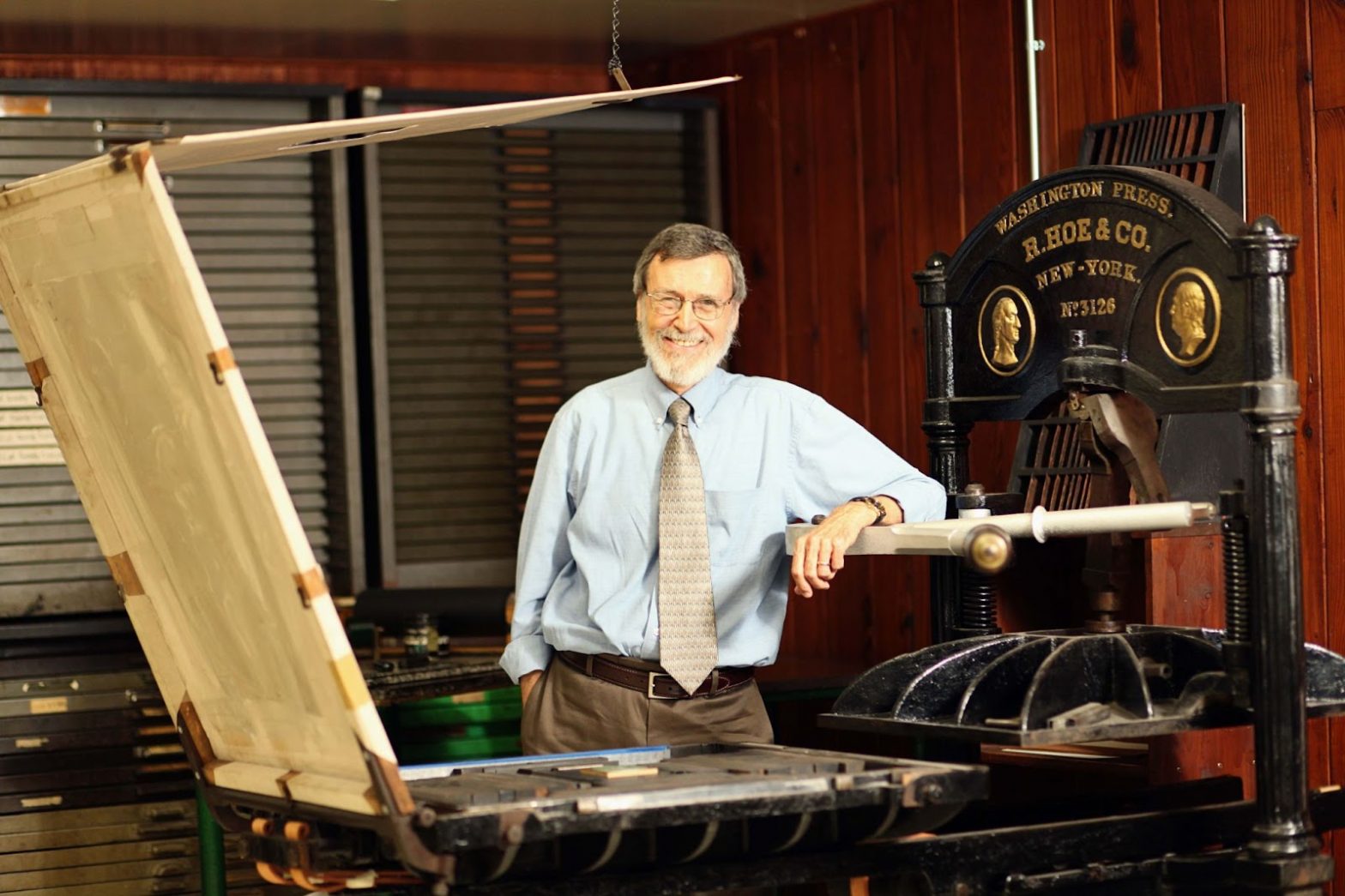The editors and staff of the University of Tampa Press are deeply saddened by the passing of colleague, mentor, and friend, Richard Mathews. Over his decades as University of Tampa Press Director, Richard published over 100 books, building the Press’s reputation as an esteemed source for contemporary literature, book arts, and regional history. His enthusiasm and dedication to the art of bookmaking permeated all of his work for the press, whether he was editing Tampa Review, publishing books, mentoring colleagues, or teaching students how to use antique presses.
His UT colleagues and friends will remember Richard not only for his tireless dedication to his work, but also for being a warm and loving person. Richard took genuine interest in and had endless patience for others. His face lit up when he shared news of his growing grandchildren or of planning a trip to visit his adult children. We are grateful to his wife, Julie, and his whole family, for sharing Richard with us.
A champion of printmaking, book arts, and antique printing presses, Richard loved sharing his passions through the Tampa Book Arts Studio (TBAS), which he founded in 2008 and directed until its closing in 2020. The TBAS preserved historical letterpress printing traditions with equipment from the 19th and early 20th centuries. As a working letterpress print shop, the TBAS allowed visitors the unique experience of using these rare antique presses. Over the years, Richard hosted many groups and events in the TBAS.

In addition to using historical and contemporary technologies to produce beautiful books, Richard made significant contributions to the history of printmaking, including preserving Frederic Goudy’s Companion typeface and printing Julius J. Lankes’ “The Rich Mouse.” Whether writing an off-the-cuff email or typesetting a book by hand, Richard used every word and dash with purpose. Look no further than any of his publications to see his meticulous attention to language and design.
Richard generously donated the TBAS’s library of books about books–including rare books, private and independent press publications, and samples of historic and artistic letterpress printing–to UT’s Macdonald-Kelce Library. The special collection comprises work from over 600 presses and more than 10,000 items, including the Lee J. Harrer Collection of Books about Books, the J. B. Dobkin Peter Pauper Press Collection, the Dobkin Collection of 19th Century Letter Writing Manuals, and the Les Feller Family Collections.
Richard’s visionary leadership turned Tampa Review from a pioneering Florida publication that attracted poets from all over the country to an internationally renowned, multi-genre journal, which has published authors such as J. Malcolm García, Derek Walcott, and Peter Meinke, and is Florida’s longest continuously published literary journal. Part of Richard’s mission for Tampa Review was to ensure that it was also a home for young writers, and he was particularly proud of the journal’s involvement in AWP’s Intro Journals Project, which provides publication opportunities for students enrolled in various creative writing programs. Tampa Review’s involvement with the program continues to this day.

With an infectious passion for bookmaking, Richard introduced countless students to historical printing over the 34 years he taught at UT. In 2000, Richard was one of a handful of UT professors to be appointed as a Charles A. Dana Professor, which is a national distinction recognizing exceptional contributions to the university and discipline. Richard taught courses on science fiction, British literature, J.R.R. Tolkien, poetry, book arts, and academic writing. He deeply enjoyed working with students and fellow faculty, providing hands-on experience in printmaking, papermaking, typesetting, and design. Many UT alums count his Book Arts Studio class as one of the most memorable hands-on experiences of their college careers.
In addition to his prolific work at the UT Press, Richard published several books of his own, including two poetry collections, A Mummery (Konglomerati 1975) and Numbery (Borgo 1995), and a book on fantasy and science fiction, Fantasy: The Liberation of Imagination (Routledge 2002). His poetry also appears in Poet Lore, Southern Poetry Review, Berkeley Poetry Review, Louisville Review, A Geography of Poets, and other venues. More recently, Richard co-edited Printing for Book Production: Emery Walker’s Three Lectures for The Sandars Readership in Bibliography (Oak Knoll 2019).
Richard made immeasurable contributions to the worlds of literature and publishing, and in the many lives he touched as a publisher, teacher, and friend. We, at UT Press, are honored to be a part of Richard’s legacy and we aspire to carry it forward.
For more about Richard’s life as a writer and publisher, read his 2011 Best American Poetry interview.
